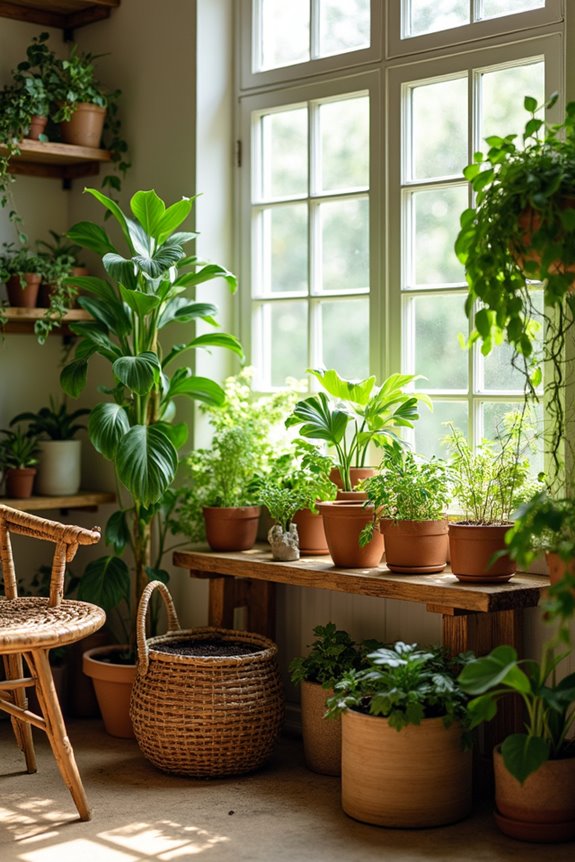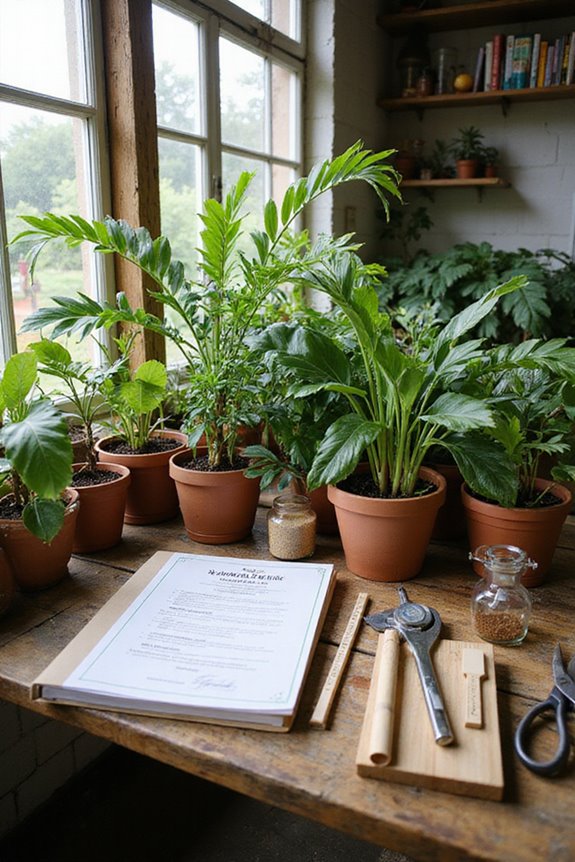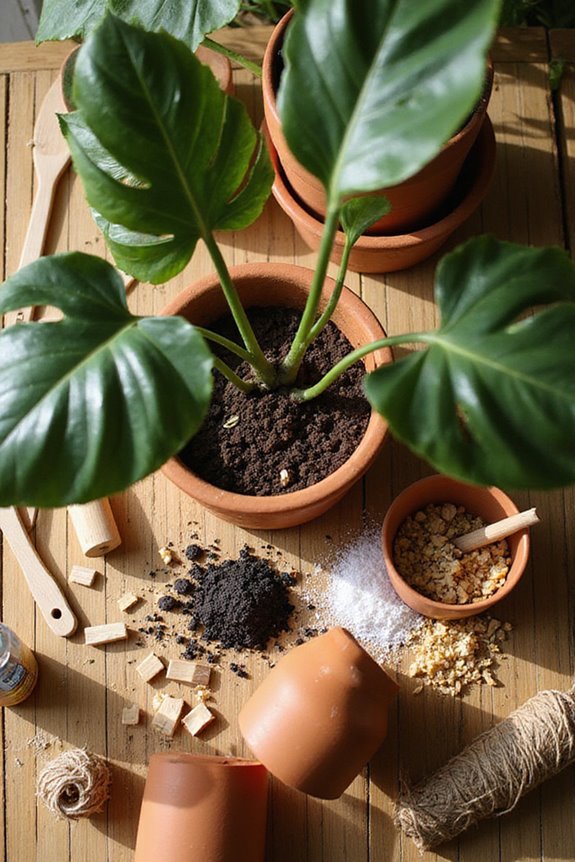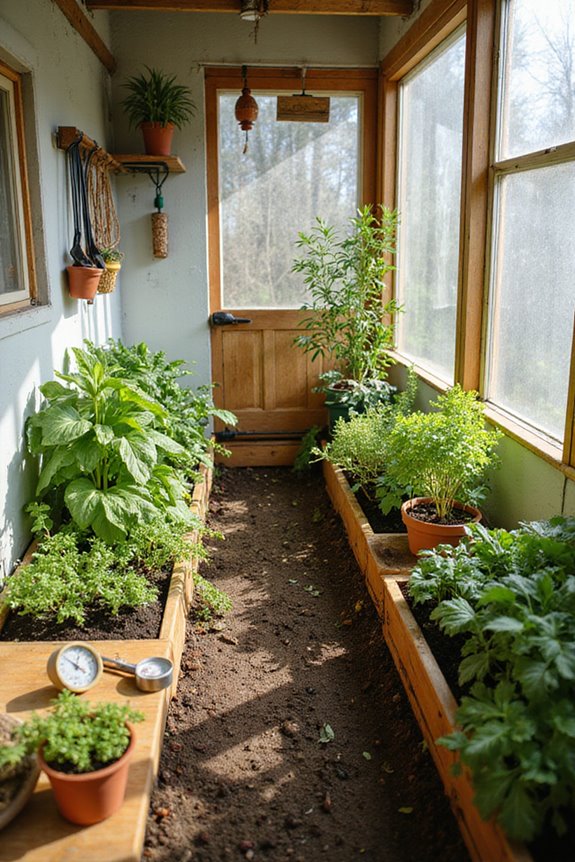Indoor gardens offer various health benefits that can improve our well-being. First, they help enhance our immune systems by increasing microbial exposure, which supports better health. Second, indoor plants reduce stress and boost our mood, lowering cortisol levels. Additionally, having plants around improves our attention and cognitive function, making tasks easier to manage. Finally, they provide fresh, nutritious food, promoting healthier eating habits. Let’s explore more about how indoor gardening can enrich our lives.
Key Takeaways
- Indoor gardens enhance immune system function by increasing microbial exposure and supporting the diversity of skin microbiota.
- Engaging with indoor plants reduces stress and anxiety, promoting emotional well-being and comfort.
- The presence of greenery boosts attention, cognitive function, and creativity, improving productivity and focus during tasks.
- Indoor plants contribute to better physical health by lowering blood pressure, aiding pain management, and enhancing recovery post-surgery.
- Homegrown vegetables and herbs from indoor gardens improve nutritional intake and encourage healthier eating habits.
Immune System Enhancement
Indoor gardening can considerably enhance our immune systems, especially in urban settings where natural microbial exposure is limited. By cultivating plants in microbially rich soil, we can increase our skin microbiota diversity. This diversity is linked to better anti-inflammatory responses, helping our bodies regulate immune functions more effectively.
- Exposure to diverse microbes supports our gut health, vital for systemic immune defense.
- Just one month of indoor gardening has been shown to raise anti-inflammatory cytokines in our blood, promoting healthier immune responses.
- For children, the benefits are even more pronounced, as microbial exposure through indoor plants supports their immune development.
Engaging in indoor gardening can restore some of the missing microbial contact essential for maintaining immune diversity.
Stress Reduction
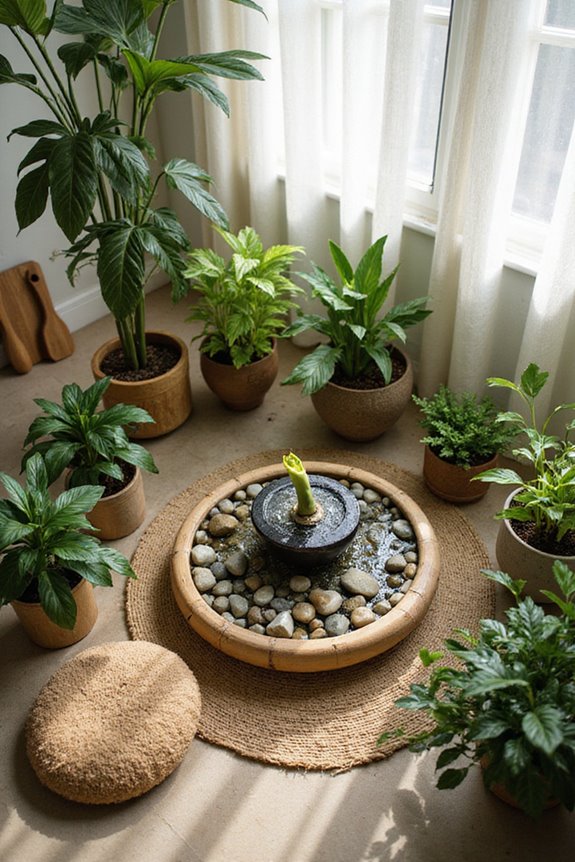
Gardening inside our homes offers significant benefits for reducing stress. Engaging with indoor plants serves as one of our effective stress management techniques. Studies show that active interaction with plants lowers stress markers, such as cortisol levels. This means we can feel calmer and more relaxed.
Additionally, the presence of greenery enhances our emotional well-being. It promotes feelings of comfort and creates a connection to nature, which fosters a sense of belonging. Indoor gardens can also grow herbs up to 5X faster than traditional methods, making the gardening experience even more rewarding and fulfilling.
Here are some relaxation strategies we can adopt:
- Care for small desk plants during work.
- Take a moment to observe their beauty.
- Enjoy the sensory stimulation they provide.
Improved Attention and Cognitive Function
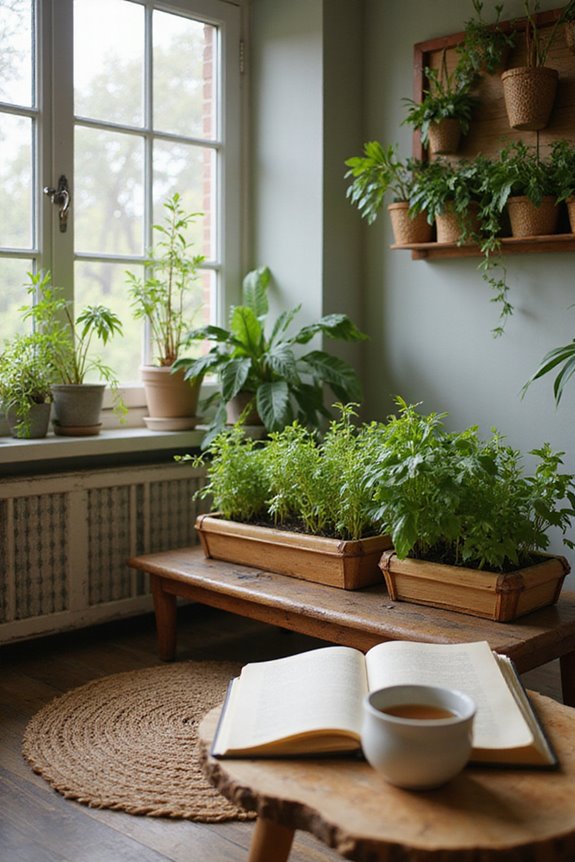
The benefits of indoor gardens extend beyond stress reduction; they also play a significant role in enhancing our attention and cognitive function.
1. Cognitive Enhancement
Indoor plants improve our focus, especially during long tasks. Studies show we perform better on memory tests when plants are present.
2. Attention Restoration
Simply looking at greenery during breaks helps us regain our focus. This visual rest reduces distractions, allowing us to persist longer in tasks.
3. Workplace Productivity
Environments filled with plants boost productivity and efficiency. We’re likely to make fewer errors and feel less mentally fatigued.
Incorporating indoor gardens into our spaces not only beautifies our environment but also supports our cognitive abilities, making daily tasks more manageable and enjoyable.
Physical Health Benefits
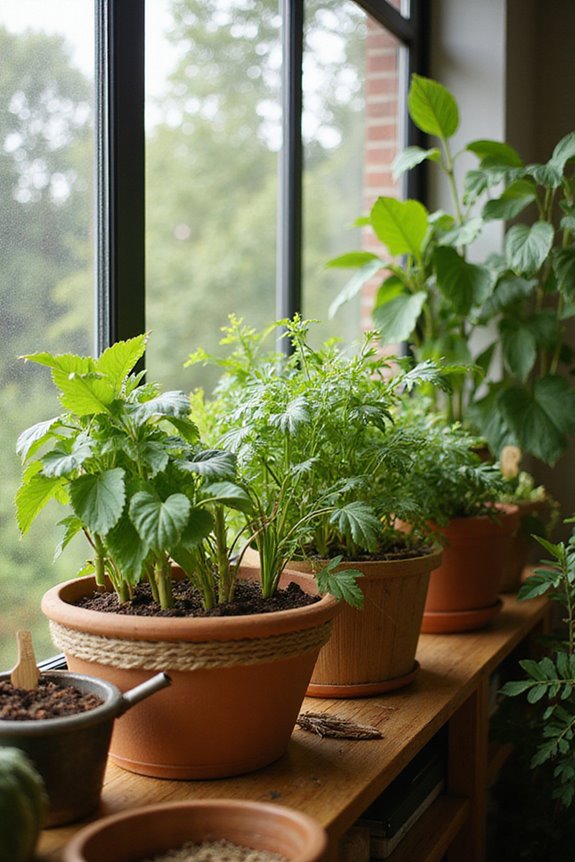
While we appreciate the aesthetic appeal of plants, their physical health benefits are equally important. Here are some key points to contemplate:
- Pain Management: Studies show that patients with indoor plants experience less post-operative pain and require fewer pain medications. The calming presence of plants supports faster recovery.
- Cardiovascular Wellness: Indoor plants can notably lower blood pressure, promoting cardiovascular health. They help reduce stress markers, which is vital for heart health.
- Reduced Fatigue and Headaches: Interaction with plants can decrease fatigue and headaches by 20-25%. Increased humidity from plants alleviates dryness and can enhance energy levels.
Incorporating indoor gardens in our spaces can lead to notable improvements in our overall physical health.
Air Quality Improvement
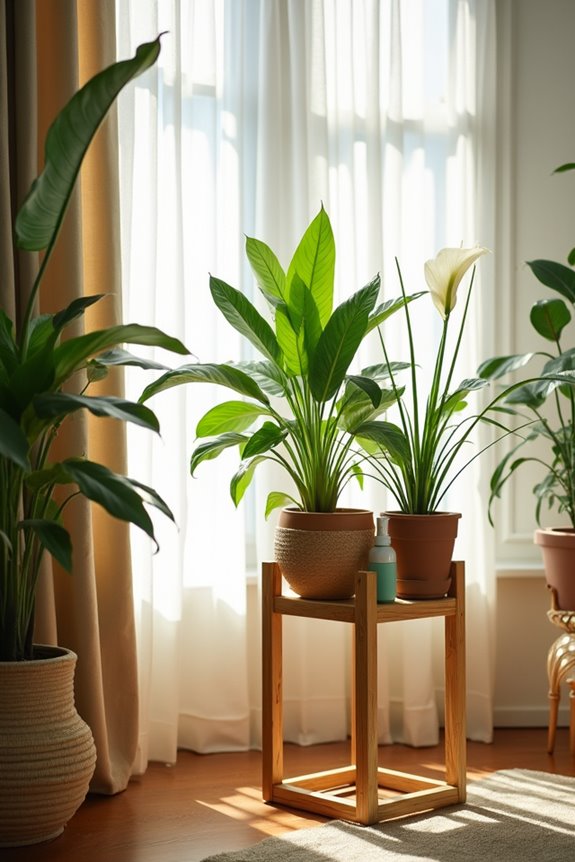
Indoor air quality is a critical aspect of our health that we often overlook. Many people believe houseplants improve air quality, but this is rooted in air quality misconceptions. While early studies showed houseplants could reduce certain volatile organic compounds (VOCs), real-world evidence suggests otherwise.
- Ventilation Importance: Natural airflow is much more effective at removing pollutants than plants.
- Plant Limitations: To make a significant impact, we’d need hundreds of plants in our homes.
In reality, air purifiers and proper ventilation systems are key for cleaner air. While plants can enhance our environment visually, they shouldn’t be relied on for air purification. Let’s focus on practical solutions for keeping our indoor spaces healthy.
Social and Psychological Benefits
Caring for plants can offer us valuable social and psychological benefits that enhance our overall well-being. Engaging with indoor gardens fosters social connection, as we can share experiences and tips with friends or in community groups. This shared purpose can help us feel less isolated, especially in today’s world.
Additionally, tending to plants has been linked to improved emotional wellbeing. It reduces stress and anxiety, elevating our mood through the release of serotonin and dopamine. Each milestone in a plant’s growth gives us a sense of accomplishment, boosting our spirits.
Boosting Nutritional Intake
Boosting our nutritional intake can be as simple as growing our own food at home. Indoor gardens provide easy access to fresh vegetables and herbs, encouraging us to eat more produce. This increase in fresh food not only enhances our meals but also improves dietary variety.
- Nutrient Density: Homegrown crops like leafy greens and microgreens are rich in vitamins A, C, K, and potassium.
- Improved Diet Quality: Cooking meals from scratch with fresh ingredients leads to healthier eating habits.
- Convenience: Indoor gardening makes it affordable to access nutrient-dense foods, especially in urban areas. Additionally, many indoor gardening kits, such as hydroponics systems, allow for faster growth rates and higher yields, making it easier to enjoy fresh produce year-round.
Therapeutic Effects of Gardening
Gardening at home offers more than just fresh food; it also provides significant mental health benefits. Engaging with plants helps us reduce stress and anxiety, lowering cortisol levels effectively. This connection fosters emotional regulation, allowing us to feel more grounded in our daily lives.
Moreover, gardening supports trauma recovery by creating a calming environment. The act of nurturing plants instills a sense of purpose and accomplishment. Our focus shifts toward growth, enhancing our mood and well-being.
Enhancing Indoor Aesthetics
Enhancing the aesthetics of our indoor spaces can transform how we experience our homes. By introducing indoor gardens, we create vibrant color contrast that livens up any room. These plants provide a dynamic visual element, softening hard architectural lines while drawing the eye to focal points.
We can also enjoy texture variety through different leaf shapes and foliage, which adds depth and interest. This infusion of natural beauty makes our environments feel more inviting and sophisticated. Incorporating bamboo furniture can further enhance these gardens, connecting our spaces with nature and adding rustic charm.
Indoor gardens allow for creative placement in shelves, corners, or tabletops, adapting easily to any style. They not only elevate our spaces but also reduce the need for extra décor. Overall, indoor gardens make our homes feel more personal and welcoming.
Creating a Connection With Nature
Indoor gardens do more than beautify our spaces; they also help us reconnect with nature, even when we’re indoors. Engaging with our plants offers rich nature experiences that ground us. Simple acts like watering and pruning can serve as calming rituals, alleviating our anxiety and stress.
- Sensory Engagement: Touching soil and observing plant growth fosters mindfulness, helping us feel connected to life around us.
- Mood Enhancement: Indoor plants elevate our spirits by stimulating serotonin production, encouraging happiness and comfort.
- Cognitive Benefits: Interacting with plants can boost our focus and creativity, enhancing our productivity in daily tasks. Additionally, cultivating indoor gardens often involves effective gardening techniques that promote a deeper understanding of plant care and growth.
Incorporating indoor gardens into our lives creates a nurturing environment where we can thrive together with nature.
Frequently Asked Questions
How Do Indoor Gardens Affect Indoor Humidity Levels?
Indoor gardens play an essential role in humidity regulation and air purification. Together, we can create a healthier environment, enhancing our comfort and well-being while enjoying the beauty of nature right inside our homes.
Can Indoor Gardening Be Practiced in Small Apartments?
Absolutely, we can practice indoor gardening in small apartments! By optimizing space and carefully selecting plants, we create beautiful green havens, fostering a sense of belonging and connection to nature right in our cozy homes.
What Types of Plants Are Best for Indoor Gardening?
Imagine our indoor space as a vibrant canvas. We can fill it with herb varieties and low light plants like snake plants and peace lilies, creating a welcoming, green haven that nurtures both our hearts and homes.
How Much Time Is Needed for Indoor Gardening to Be Beneficial?
To reap indoor gardening’s benefits, we recommend a time investment of at least 5-10 minutes several times a week. With consistent gardening frequency, we can enhance our well-being and enjoy nature’s calming presence together.
Are There Any Costs Associated With Starting an Indoor Garden?
Starting an indoor garden does involve some initial investment and ongoing maintenance costs. But together, we can create a space that nurtures our plants and fosters our well-being, making every penny worth it.

